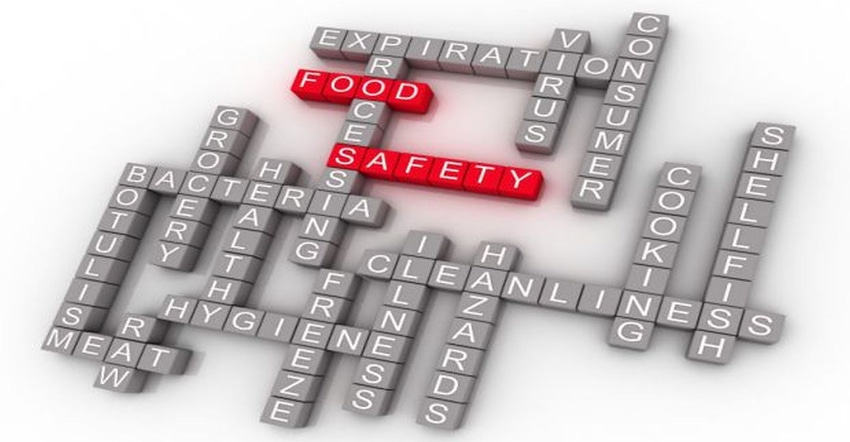USDA releases roadmap to control salmonella
Stakeholders invited to participate in public meeting on salmonella roadmap on Sept. 22.

The U.S. Department of Agriculture’s Office of Food Safety (OFS) and the Food Safety & Inspection Service (FSIS) have released a plan to decrease levels of salmonella, one of the leading causes of foodborne illnesses. The "Roadmap to Reducing Salmonella: Driving Change through Science-Based Policy" outlines programs and policies that are science based, data driven and promote innovation to reduce salmonella in meat, poultry and egg products.
Although findings from a recent analysis of FSIS data show that there has been an overall reduction in the occurrence of salmonella on meat and poultry products over the past 20 years, there is still work to be done, the roadmap states. “The food safety community did not meet the 2020 national public health goal for reduction of salmonella illnesses, and FSIS remains committed to working toward achieving the target set for 2030,” the report added.
“This roadmap represents FSIS’s commitment to lead with science and data in all that we do. It puts us on a course to aggressively target salmonella and other foodborne pathogens,” USDA undersecretary for food safety Dr. Mindy Brashears said. “I look forward to continued partnership with the food safety community in driving a science-based approach to protecting public health.”
Modernizing inspection systems addresses salmonella reduction by creating a new inspection system under which establishments could choose to operate; the new system increases the utilization of FSIS inspectors conducting offline inspection tasks that have the biggest impact on public health while maintaining online carcass-by-carcass inspection. In addition, requiring additional establishment microbiological sampling so the establishment can assess the effectiveness of its food safety system, make decisions that improve pathogen control and ensure food safety.
FSIS is in the process of modernizing egg products inspection. Additionally, modernization of beef slaughter inspection using a science-based process is under consideration. Both egg products and beef modernization allow for more innovation in how establishments target and control pathogens, including salmonella, in their production processes, the roadmap states.
Salmonella performance standards are in place to encourage establishments to take action to reduce salmonella in their products. Performance standards hold the industry responsible for maintaining control of pathogens and implementing best practices and intervention technologies to keep their products safe for consumers.
FSIS currently has performance standards in place for salmonella in poultry products. Proposed standards for campylobacter in comminuted poultry and for salmonella in ground beef and beef manufacturing trimmings were open for public comment, and FSIS is analyzing the public comments while finalizing the standards under development. “By the end of the year, we plan to propose salmonella pork performance standards for comminuted products and pork cuts, thus addressing all major meat and poultry commodities under FSIS authority,” the roadmap adds.
As of 2019, FSIS has fully implemented routine pork product sampling at regulated establishments. This sampling continues and has replaced carcass sampling that found few positive salmonella samples.
In 2019, FSIS proposed updated pathogen reduction performance standards for salmonella in raw ground beef and new salmonella performance standards for beef manufacturing trimmings -- the primary component used to make ground beef -- to ensure that establishments are consistently controlling or reducing salmonella. FSIS also proposed to allocate resources more effectively. The proposed performance standards will drive change in the beef processing industry to utilize more effective salmonella controls. These performance standards will supplement testing for the seven Shiga toxin-producing Escherichia coli strains that are considered adulterants in certain raw beef products.
OFS and FSIS will discuss the salmonella roadmap at a virtual public meeting on Sept. 22. Also participating in the meeting are USDA’s Agricultural Research Service, the U.S. Food & Drug Administration and the Centers for Disease Control & Prevention. The public meeting continues Brashears’ vision of building relationships, influencing behavior change and leading with science to enhance food safety.
Stakeholders are invited to participate in the public meeting and comment on the salmonella roadmap and on the science that drives FSIS’s salmonella reduction efforts. The public meeting has reached its capacity for oral comments. Interested parties can still submit written comments by Sept. 25, 2020, at www.regulations.gov.
The Sept. 22 virtual public meeting will be held from 9 a.m. to 5 p.m. (ET) and may be viewed via the Webex link provided by email upon registration for the meeting. There is no fee to register for the public meeting, but pre-registration is mandatory for participants to attend. More information is available at www.fsis.usda.gov/meetings.
About the Author(s)
You May Also Like





